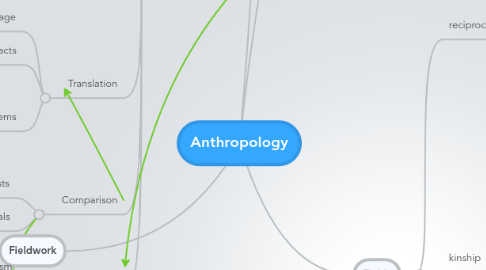
1. Fieldwork
1.1. observation
1.2. structured interview
1.3. historical research
2. Key concepts
2.1. Language
2.1.1. Sapir-Whorf hypothesis
2.2. Theories of person
2.2.1. Socio-centric
2.2.1.1. Relational
2.2.2. Egocentric
2.2.3. Ancestor-centric
2.2.4. Gender
2.3. Theories of society
2.3.1. Henry Maine
2.3.1.1. Status socities
2.3.1.2. Contract societies
2.3.2. Ferdinand Tönnies
2.3.2.1. Gemeinschaft (community)
2.3.2.2. Gesellschaft (society)
2.4. Theories of culture
2.4.1. problems
2.4.1.1. inaccurate
2.4.1.2. change
2.4.1.3. boundaries
2.4.1.4. internal variation
2.4.1.5. apartheid
2.4.2. cultural relativism
2.5. Translation
2.5.1. language
2.5.2. acts
2.5.3. problems
2.5.3.1. misrepresentation
2.5.3.2. subjectivity
2.5.3.3. misaligned data organisation
2.6. Comparison
2.6.1. contrasts
2.6.2. search for human universals
2.7. Connection
2.7.1. holism
2.7.1.1. integration
2.7.1.2. non-integration
2.7.2. context
3. Fields
3.1. reciprocity
3.1.1. Marcel Mauss - gift-giving
3.1.1.1. give
3.1.1.2. receive
3.1.1.3. return
3.1.2. Karl Polanyi - integration
3.1.2.1. reciprocity
3.1.2.2. redistribution
3.1.2.3. market principle
3.1.3. Marhsall Sahlins
3.1.3.1. balanced
3.1.3.2. generalised
3.1.3.3. negative
3.1.4. Annette Weiner - Inalienable Possessions
3.1.5. Daniel Miller- sacrifice
3.2. kinship
3.2.1. segementary/acephalous
3.2.2. alliance (marriage)
3.2.3. house (relational)
3.3. nature
3.3.1. inner nature
3.3.2. external nature
3.3.3. social construction
3.3.4. sociobiology
3.4. thought
3.4.1. rationality
3.4.2. classification
3.4.3. the savage mind
3.4.4. thought & technology
3.5. identification
3.5.1. the social
3.5.2. relational & situational
3.5.3. imperative & chosen identities
3.5.4. degrees of identification
4. Theories
4.1. Structural-functionalism
4.2. Cultural-materialism
4.3. Agency and society
4.4. Structuralism
4.5. Primacy of the material
4.5.1. historical materialism
4.5.2. cybernetics
